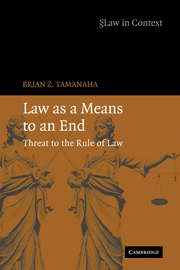Book contents
- Frontmatter
- Contents
- Acknowledgments
- Introduction
- Part 1 The spread of legal instrumentalism
- 1 Non-instrumental views of law
- 2 A changing society and common law in the nineteenth century
- 3 Nineteenth-century legislation and legal profession
- 4 Instrumentalism of the legal realists
- 5 Twentieth-century Supreme Court instrumentalism
- Part 2 Contemporary legal instrumentalism
- Part 3 Corroding the rule of law
- Epilogue
- Index
- Titles in the series
3 - Nineteenth-century legislation and legal profession
Published online by Cambridge University Press: 25 July 2009
- Frontmatter
- Contents
- Acknowledgments
- Introduction
- Part 1 The spread of legal instrumentalism
- 1 Non-instrumental views of law
- 2 A changing society and common law in the nineteenth century
- 3 Nineteenth-century legislation and legal profession
- 4 Instrumentalism of the legal realists
- 5 Twentieth-century Supreme Court instrumentalism
- Part 2 Contemporary legal instrumentalism
- Part 3 Corroding the rule of law
- Epilogue
- Index
- Titles in the series
Summary
Although non-instrumental views of law were widely repeated through the end the nineteenth century, as the foregoing two chapters establish, in two important arenas instrumental views of law had already take hold earlier. Legislation was seen in throughly instrumental terms throughout this period, and expanded in volume and significance with the passage of time; the practice of law, in crucial respects, was also described and perceived in instrumental terms. Both of these arenas of instrumental understandings of law – explored in this chapter – fed into and set up the more pervasive instrumentalism to come in the twentieth century.
Contest between legislation and common law
In eighteenth-century England, and for at least a century before that, legislation was an increasing source of law-making. Classical views of the common law allowed little place for the active creation of law by legislation, however. Within the common law tradition, the proper role of legislation was mainly to declare preexisting customary law (although it often did more than that). Jurists claimed that the common law was coherent, ordered, and comprehensive. Legislation posed a threat to the systematic and rational nature of the common law. Jurists accorded supremacy in the hierarchy of law-making to the common law, for only common law judges were trained in rational science of law, not legislators, and only judges could be trusted to faithfully recognize the customs of the people. Judges were openly hostile to the increase in the frequency and scope of legislation, which they opposed at every turn.
- Type
- Chapter
- Information
- Law as a Means to an EndThreat to the Rule of Law, pp. 41 - 59Publisher: Cambridge University PressPrint publication year: 2006
- 1
- Cited by

